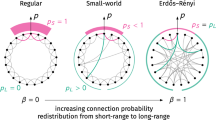Abstract
We consider small world graphs as defined by Kleinberg (2000), i.e., graphs obtained from a d-dimensional mesh by adding links chosen at random according to the d-harmonic distribution. In these graphs, greedy routing performs in O(log 2 n) expected number of steps. We introduce indirect-greedy routing. We show that giving O(log 2 n) bits of topological awareness per node enables indirect-greedy routing to perform in O(log 1+1/d n) expected number of steps in d-dimensional augmented meshes. We also show that, independently of the amount of topological awareness given to the nodes, indirect-greedy routing performs in Ω(log 1+1/d n) expected number of steps. In particular, augmenting the topological awareness above this optimum of O(log 2 n) bits would drastically decrease the performance of indirect-greedy routing.
Our model demonstrates that the efficiency of indirect-greedy routing is sensitive to the “world’s dimension,” in the sense that high dimensional worlds enjoy faster greedy routing than low dimensional ones. This could not be observed in Kleinberg’s routing. In addition to bringing new light to Milgram’s experiment, our protocol presents several desirable properties. In particular, it is totally oblivious, i.e., there is no header modification along the path from the source to the target, and the routing decision depends only on the target, and on information stored locally at each node.
Similar content being viewed by others
Explore related subjects
Discover the latest articles and news from researchers in related subjects, suggested using machine learning.References
Adamic, L., Adar, E.: How To Search a Social Network. Technical Report, HP Labs, Palo Alto (2003)
Aspnes, J., Diamadi, Z., Shah, G.: Fault-tolerant routing in peer-to-peer systems. In: 21st ACM Symposium on Principles of Distributed Computing (PODC), pp. 223–232 (2002)
Barrière, L., Fraigniaud, P., Kranakis, E., Krizanc, D.: Efficient routing in networks with long range contacts. In: 15th International Symposium on Distributed Computing (DISC). LNCS 2180, pp. 270–284. Springer-Verlag, Berlin Heidelberg, New York (2001)
Coppersmith, D., Gamarnik, D., Sviridenko, M.: The diameter of a long-range percolation graph. Random Struct. Algorithms 21(1), 1–13 (2002)
Dodds, P., Muhamad, R., Watts, D.: An experimental study of search in global social networks. Science 301, 827–829 (2003)
Killworth, P., Bernard, H.: Reverse small-world experiment. Soc. Networks 1(2), 159–192 (1978)
Kleinberg, J.: The small-world phenomenon: an algorithmic perspective. In: 32nd ACM Symposium on Theory of Computing (STOC), pp. 163–170 (2000)
Kleinberg, J.: Navigation in a small-world. Nature 406, 845 (2000)
Kleinberg, J.: Small-world phenomena and the dynamics of information. In: 15th Neural Information Processing Systems (NIPS) (2001)
Lebhar, E., Schabanel, N.: Searching for optimal paths in long-range contact networks. In: 31st International Colloquium on Automata, Languages and Programming (ICALP). LNCS 3142, pp. 894–905 (2004)
Manku, G., Bawa, M., Raghavan, P.: Symphony: distributed hashing in a small world. In: 4th USENIX Symposium on Internet Technologies and Systems, pp. 127–140 (2003)
Manku, G., Naor, M., Wieder, U.: Know thy neighbor’s neighbor: the power of lookahead in randomized P2P networks. In: 36th ACM Symposium on Theory of Computing (STOC) (2004)
Martel, C., Nguyen, V.: Analyzing Kleinberg’s (and other) small-world models. In: 23rd ACM Symposium on Principles of Distributed Computing (PODC), pp. 179–188 (2004)
Milgram, S.: The small-world problem. Psychol. Today, pp. 60–67 (1967)
Travers, J., Milgram, S.: An experimental study of the small world problem. Sociometry 32, 425 (1969)
Watts, D., Dodds, P., Newman, M.: Identity and search in social networks. Science 296, 1302–1305 (2002)
Watts, D., Strogatz, S.: Collective dynamics of small-world networks. Nature 393, 440–442 (1998)
Author information
Authors and Affiliations
Corresponding author
Additional information
A preliminary version of this paper appeared in the proceedings of the 23rd ACM Symposium on Principles of Distributed Computing (PODC), St. Johns, Newfoundland, Canada, July 25–28, 2004.
Rights and permissions
About this article
Cite this article
Fraigniaud, P., Gavoille, C. & Paul, C. Eclecticism shrinks even small worlds. Distrib. Comput. 18, 279–291 (2006). https://doi.org/10.1007/s00446-005-0137-4
Received:
Accepted:
Published:
Issue Date:
DOI: https://doi.org/10.1007/s00446-005-0137-4




